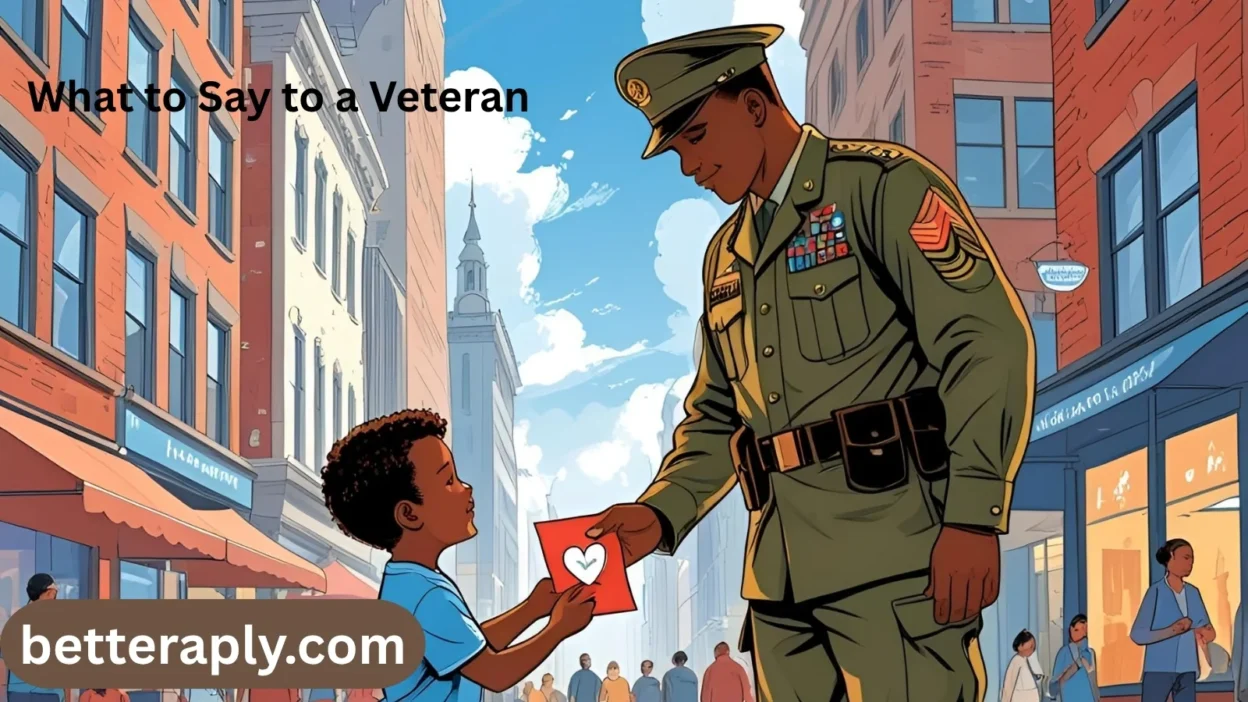Meeting a veteran can stir deep respect, gratitude, and sometimes uncertainty. You may feel unsure of what to say to a veteran—wanting to show appreciation without sounding awkward, impersonal, or offensive. Veterans come from all walks of life, with different experiences and emotions tied to their service. Some enjoy talking about their time in the military; others prefer not to.
That’s why choosing the right words is important. Whether you’re meeting a veteran at a public event, speaking with a coworker, or talking to a friend or family member who served, your words can either build connection—or unintentionally cause discomfort.
In this guide, we’ll explore how to respectfully and sincerely speak to a veteran, including examples of what to say and what to avoid. Let’s ensure your words carry the kindness and care they deserve.
Sorry Generator
Start With a Simple, Sincere Thank You
A heartfelt “Thank you for your service” is a good place to begin. While some veterans may hear it often, it still means a lot—especially when it’s said with sincerity.
What to say:
- “Thank you for your service. I truly appreciate what you’ve done.”
- “I’m grateful for your sacrifices and dedication.”
What NOT to say:
- “I bet you’ve seen some crazy stuff, huh?”
- “Did you kill anyone?”
- “You don’t look like a veteran.”
💡 Scenario: You meet a veteran at a community event. A smile, a handshake, and “I appreciate your service” is respectful and meaningful.
Ask If They’re Comfortable Sharing
Not every veteran wants to talk about their military experience—and that’s okay. Ask first before diving into questions.
What to say:
- “Would you be open to sharing a little about your service?”
- “If you’re comfortable, I’d love to hear about your time in the military.”
What NOT to say:
- “You HAVE to tell me what it was like over there.”
- “Why don’t you want to talk about it?”
- “Come on, just give me one war story.”
💬 Give veterans space to decide what they want to share. Listening is just as important as speaking.
Focus on Their Life Now, Too
Veterans are more than just their military service. They’re parents, workers, students, and community members. Ask about their present and future—not just the past.
What to say:
- “What are you up to these days?”
- “Are you working on any new projects or hobbies?”
- “How has life been since transitioning out of the military?”
What NOT to say:
- “So are you just retired now?”
- “You must miss the action, huh?”
- “Life must be boring after that.”
🎯 Recognize their full identity—military service is just one chapter of their story.
Show Respect Without Making Assumptions
Not all veterans have seen combat. Some served in support roles or never deployed. Don’t assume their experience or beliefs.
What to say:
- “Thank you—every role in the military is important.”
- “I admire your service, regardless of where or how you served.”
What NOT to say:
- “Were you in the Army or the real military?”
- “Oh, you didn’t deploy? That doesn’t really count.”
- “You must be super patriotic.”
👀 Avoid stereotyping. Respect comes from understanding—not assuming.
Offer Help or Support If Appropriate
If a veteran opens up about struggles, be a good listener. Don’t try to fix everything—sometimes, just being there is enough.
What to say:
- “Thank you for trusting me with that.”
- “Is there any way I can support you right now?”
- “I’m here if you ever want to talk again.”
What NOT to say:
- “You should just get over it.”
- “That’s nothing compared to what I’ve been through.”
- “You seem fine—what’s the problem?”
🧠 Veterans may face mental health challenges or stress. Be kind, patient, and nonjudgmental.
Support Veterans Beyond Words
Saying the right thing is powerful—but actions also speak volumes. Look for ways to support veterans in daily life.
What to say (and do):
- “I saw there’s a local event for veterans—want to go together?”
- “There’s a group that helps vets transition to new careers—I can connect you if you’d like.”
- “I’d love to support veteran-owned businesses. Do you have any recommendations?”
What NOT to say:
- “You already got your benefits, right? What more do you need?”
- “I don’t see why veterans get special treatment.”
- “Why do you even bring it up anymore?”
🎗️ Advocacy, volunteering, and listening all matter. Your support can go beyond words.
Final Thoughts:
Knowing what to say to a veteran comes down to three things: respect, empathy, and listening. A simple “thank you,” an open heart, and a willingness to understand go a long way. Whether they want to share their story or just move forward with life, let your words reflect kindness—not assumptions.





[…] You for another day to try […]
[…] 💬 Real-life tip: When greeting someone at work or school, a simple “Eid Mubarak! Hope you have a wonderful day with your family” is thoughtful and appreciated. […]